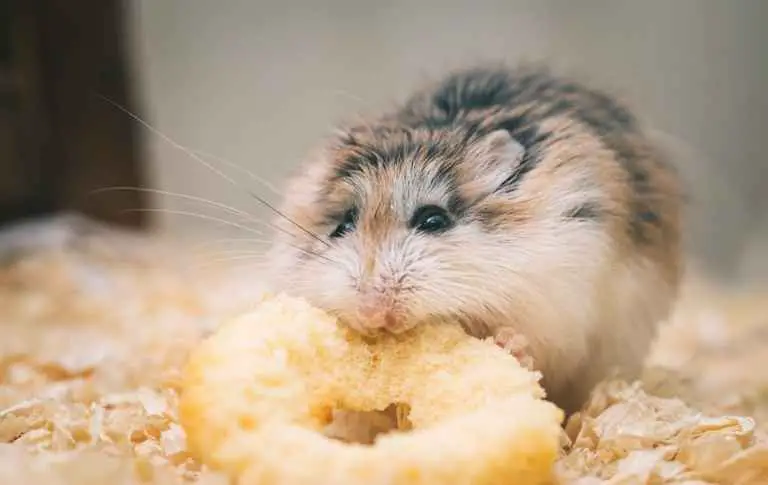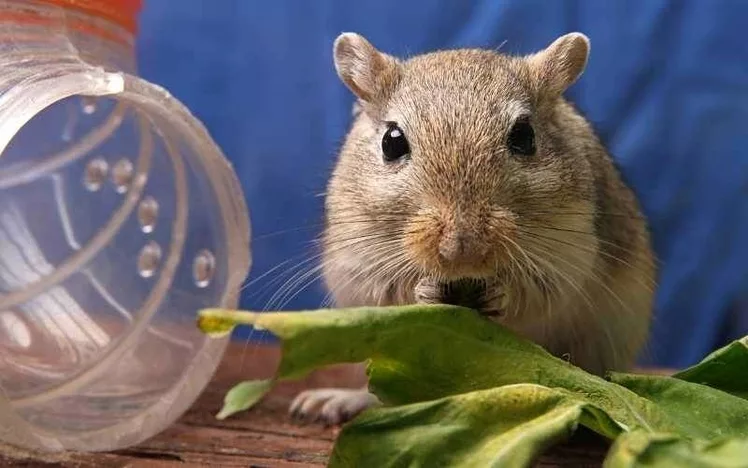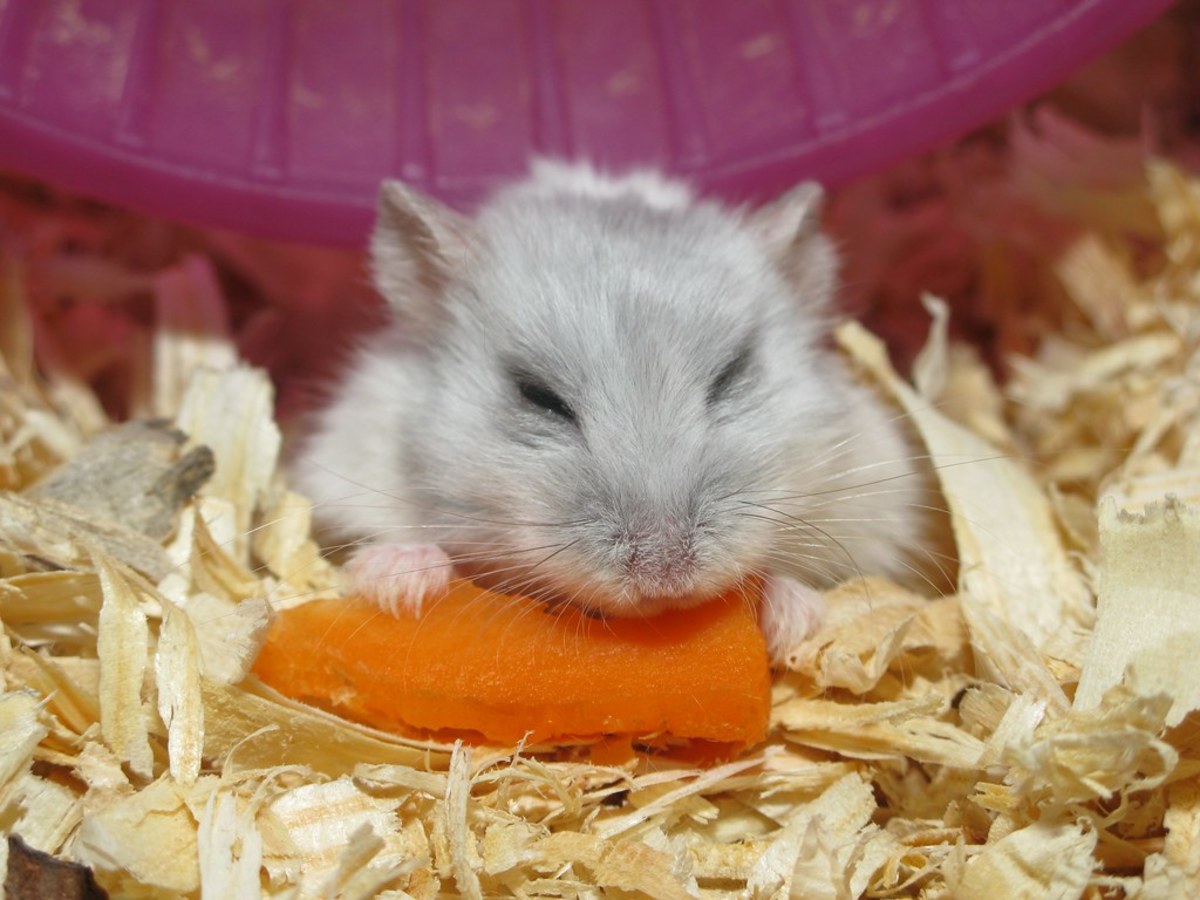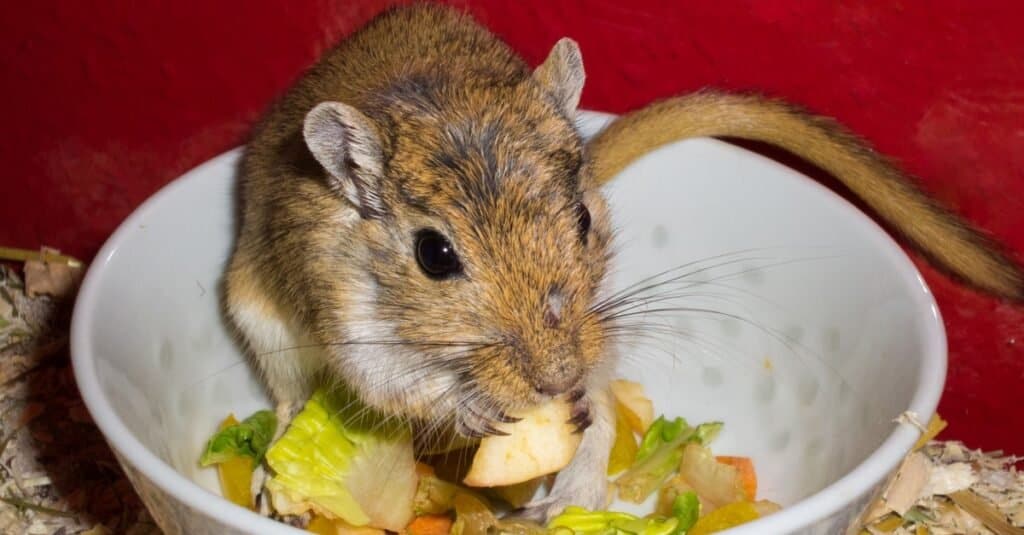
Introduction
What Do Gerbils Eat- Gerbils, those charming and inquisitive little rodents, have captured the hearts of many as popular pets due to their friendly demeanor and low-maintenance care requirements. These small creatures, native to arid regions of Africa and Asia, are known for their energetic antics and social nature. But, like all living beings, gerbils have specific dietary needs that are essential for their health and well-being. So, what do gerbils eat?
Understanding the dietary requirements of gerbils is a vital aspect of responsible gerbil ownership. Just like any pet, gerbils thrive when provided with a balanced and nutritious diet tailored to their specific needs. In the wild, gerbils are opportunistic feeders, consuming a variety of seeds, grains, insects, and plant matter. They have adapted to their harsh desert environment, where food resources can be scarce and seasonal.

As gerbils transition from their natural habitat to our homes, it’s crucial for owners to replicate their dietary needs in captivity to ensure they remain healthy, active, and content. This involves providing a mix of specially formulated gerbil pellets, fresh vegetables, occasional fruits, and small amounts of high-quality hay. The right diet for your gerbil can vary depending on their age, activity level, and individual preferences.
In this exploration of “What do gerbils eat?” we will delve into the intricacies of gerbil nutrition, helping you gain insights into their dietary preferences and requirements. We will cover not only what they can eat but also what they should avoid to maintain their health. Whether you are a new gerbil owner seeking guidance or an experienced enthusiast looking to refine your gerbil’s diet, this comprehensive guide will equip you with the knowledge to provide the best possible nourishment for your cherished pets.
Do gerbils eat everyday?
How often should you feed gerbils? Gerbils need to be fed daily to keep them sustained. You should, however, be wary of feeding them foods with high fat or sugar contents (such as fruit, nuts and seeds) every day, Gerbils can swiftly become obese. You might also find that your gerbils like to hoard their food.
Yes, gerbils typically eat every day. In the wild, their foraging behavior and constant need for nourishment drive them to search for food on a daily basis. This consistent feeding pattern has carried over into captivity, where gerbil owners should provide their pets with access to fresh food and water each day.
Gerbils have fast metabolisms, and their small bodies require a steady intake of nutrients to maintain their health and energy levels. Providing them with a daily supply of specially formulated gerbil pellets, fresh vegetables, and occasional treats ensures they receive the essential vitamins, minerals, and fiber needed for proper growth and bodily functions. Regular meals also help prevent overeating or hoarding behavior, which can lead to obesity and other health issues.
While gerbils are diligent eaters, it’s essential for owners to monitor their food intake and ensure that they consume an appropriate quantity of food each day. This helps maintain their overall health and prevents both underfeeding and overfeeding, ensuring that your gerbil remains healthy, active, and content in captivity.
What do gerbils love the most?
Other nutritious snacks gerbils enjoy include popcorn, unflavored cereal, cheese, chestnuts, insects, nuts, seeds, eggs, hay, and wholemeal bread.
Gerbils, with their charming and curious personalities, have specific preferences when it comes to their favorite foods and activities. While individual preferences may vary, here are some things that gerbils tend to love the most:
Gerbil Treats: Gerbils have a sweet tooth and often enjoy treats like sunflower seeds, pumpkin seeds, and small bits of dried fruit. These should be given in moderation due to their higher fat and sugar content. Offering treats during training or as occasional rewards can strengthen the bond between you and your gerbil.
Chew Toys: Gerbils have continuously growing teeth, so they need to chew regularly to keep them at a healthy length. Providing safe chew toys made of wood or other gnawable materials is essential. They not only enjoy chewing but also derive satisfaction from keeping their teeth in check.
Digging and Tunneling: Gerbils are natural burrowers and love to dig and tunnel in their bedding material. Providing a deep layer of bedding, such as aspen shavings or paper-based bedding, allows them to engage in this instinctual behavior. You can even create tunnels or hideaways within their enclosure to encourage their exploratory instincts.
Social Interaction: Gerbils are highly social animals and thrive on the company of their fellow gerbils. They love to groom each other, play, and snuggle together. Keeping gerbils in same-sex pairs or groups is essential to fulfill their need for social interaction and companionship.
Exercise Wheels and Toys: Gerbils are active creatures and enjoy running on exercise wheels, playing with tunnels, and climbing on structures within their enclosure. These activities provide mental stimulation and help keep them physically fit.
Fresh Vegetables: Gerbils often relish fresh vegetables like carrots, broccoli, and spinach. These provide both hydration and essential vitamins. Offering a variety of vegetables can be an enjoyable part of their diet.
It’s important to remember that each gerbil has its unique preferences, so it’s a good idea to observe your pets closely to discover what they love most. Providing a variety of toys, treats, and activities can keep your gerbils mentally and physically engaged, leading to a happy and enriched life in captivity.
What do wild gerbils eat?
In their natural habitat of arid grasslands and deserts, wild gerbils forage for a variety of foods, including seeds of various grasses, leaves and herbs. They’ll also happily chow down on locusts, worms and beetles.
Wild gerbils have a varied diet that reflects their adaptability to arid desert environments, where food resources can be scarce and seasonal. Their natural diet consists primarily of plant matter, seeds, grains, and some occasional insects.
Seeds and Grains: Gerbils are skilled seed and grain eaters, and these form a significant part of their diet in the wild. They feed on a variety of grass seeds, including those from desert plants like desert grasses and shrubs. These seeds provide essential nutrients, energy, and hydration.
Plant Material: In addition to seeds, wild gerbils consume various parts of desert plants, such as stems, leaves, and roots. This plant material provides fiber and additional nutrients necessary for their diet.
Insects: While gerbils are primarily herbivorous, they are also opportunistic feeders and may consume insects when they encounter them. Insects serve as a source of protein and essential amino acids, which can be beneficial in a diet primarily based on plant matter.
Water: Gerbils are adapted to arid environments, and they can obtain a significant portion of their hydration from their diet, especially from the moisture content in seeds and plant material. This ability to derive water from their food helps them survive in regions with limited water sources.
Underground Storage Organs: During periods when fresh vegetation is scarce, gerbils may rely on underground storage organs of plants, such as bulbs and tubers, for sustenance. These provide a source of both food and moisture.
In the wild, gerbils are foragers, constantly seeking out available food resources. Their diet is adapted to their harsh environment, and they have developed efficient mechanisms for extracting nutrients and hydration from their food sources. Understanding their natural diet helps provide appropriate nutrition and care for gerbils in captivity, as it informs the selection of foods that mimic their dietary preferences and needs.

Do gerbils eat rice?
Gerbils can eat rice safely as it doesn’t contain anything toxic or poisonous to animals. Rice won’t harm your pet unless there’s something added to it, such as salt and oil. Gerbils can eat rice that’s cooked or uncooked, brown or white, puffed rice/rice krispies, and rice cakes.
Yes, gerbils can eat rice in moderation, but it should not be a primary or exclusive part of their diet. Rice can be offered as an occasional treat or as a part of a varied diet to provide some diversity in their meals.
When offering rice to gerbils, it’s essential to prepare it properly. Plain, cooked rice without any added salt, spices, or seasonings is the best option. Brown rice or white rice is suitable, but brown rice provides more nutritional value due to its higher fiber content.
Rice can serve as a source of carbohydrates in their diet, providing energy. However, it should not replace their main food source, which should consist of high-quality gerbil pellets and fresh vegetables. Rice should be considered an occasional addition to their diet rather than a staple, as a diet too rich in rice could lead to imbalances in their nutrition.
As with any treat or addition to their diet, moderation is key. Offering small amounts of rice once in a while can be a delightful change for your gerbils, but it’s essential to ensure that their overall diet remains balanced and meets their specific nutritional requirements.
What do gerbils eat in the wild?
In the wild, gerbils have adapted to their arid desert environments and have a diverse diet that allows them to thrive despite the challenges of their habitat. Their natural diet primarily consists of seeds, grains, and various plant materials. Seeds and grains, such as those from desert grasses and shrubs, form a significant part of their nutrition. Gerbils are skilled seed eaters, and these provide essential nutrients, energy, and hydration.
In addition to seeds and grains, wild gerbils consume various parts of desert plants, including stems, leaves, and roots. These plant materials not only contribute fiber to their diet but also provide additional vitamins and minerals necessary for their survival.
While gerbils are primarily herbivorous, they are opportunistic feeders and may consume insects when they encounter them. Insects serve as a source of protein and essential amino acids, which can be beneficial in a diet primarily based on plant matter.
To adapt to their arid environment, gerbils are efficient in extracting moisture from their food, allowing them to obtain a significant portion of their hydration from seeds and plant material. This adaptation helps them survive in regions with limited access to water sources.
What should be the primary components of a pet gerbil’s diet?
The primary components of a pet gerbil’s diet should be carefully selected to mimic their natural nutritional needs while providing a balanced and healthy diet. Here are the key components that should make up the core of a gerbil’s diet:
Gerbil Pellets: Specially formulated gerbil pellets should be the cornerstone of their diet. These pellets are designed to provide the essential nutrients, vitamins, and minerals that gerbils need for proper growth and overall health. Look for high-quality commercial gerbil food that is well-balanced and free from additives or artificial coloring.
Fresh Vegetables: Fresh vegetables are an essential part of a gerbil’s diet, providing vitamins, fiber, and hydration. Options like carrots, broccoli, spinach, and cucumber are generally well-received by gerbils. Offering a variety of vegetables ensures they receive a range of nutrients.
Timothy Hay: High-quality hay, such as timothy hay, is vital for gerbils’ dental health and digestive well-being. Hay aids in wearing down their continually growing teeth and provides fiber that supports proper digestion. Hay should be available to them at all times.
Occasional Treats: While not a primary component, occasional treats can be offered to provide variety and stimulate their palate. Safe treats include sunflower seeds, pumpkin seeds, and small pieces of dried fruit. These should be given sparingly due to their higher fat and sugar content.
Fresh Water: Clean, freshwater should always be available to gerbils in a sipper bottle or water dish. Hydration is crucial for their well-being, and water should be changed daily to ensure its freshness.
It’s important to maintain a proper balance in their diet to prevent overfeeding and ensure that their nutritional needs are met. Avoid feeding them sugary or fatty treats excessively, as this can lead to obesity and other health issues. Providing a varied diet that includes all these components ensures that your pet gerbil receives the essential nutrients they require for a healthy and active life.
Are there specific foods that gerbils should avoid?
Yes, there are certain foods that gerbils should avoid to maintain their health and well-being. These include:
Citrus Fruits: Citrus fruits like oranges, lemons, and grapefruits should be avoided. They are acidic and can upset a gerbil’s sensitive digestive system, leading to stomach discomfort or diarrhea.
Sugary and Salty Foods: Gerbils should not be given sugary or salty foods. This includes candies, chocolates, and any human snacks high in sugar or sodium. These can disrupt their natural diet and lead to obesity, diabetes, or other health problems.
Processed Foods: Processed or junk foods should be off-limits. This includes chips, fried snacks, and fast food. These items are high in unhealthy fats and artificial additives that can harm a gerbil’s health.
Onion and Garlic: Foods from the allium family, such as onion and garlic, are toxic to gerbils and should never be offered. They can cause digestive issues and lead to more severe health problems.
Avocado: Avocado is another food that is harmful to gerbils. It contains a substance called persin, which can be toxic to small animals like gerbils.
Human Medications: Never give your gerbil any human medications or supplements without consulting a veterinarian. Many substances that are safe for humans can be toxic to small animals like gerbils.
Moldy or Spoiled Food: Any food that is moldy or spoiled should never be given to gerbils. Mold can contain harmful mycotoxins that can be dangerous for them.
It’s crucial to remember that gerbils have specific dietary needs, and their digestive systems are sensitive. Any new food introduced to their diet should be done gradually and in moderation to prevent digestive upset. Providing a well-balanced, species-appropriate diet is essential for the health and longevity of pet gerbils. If in doubt about a particular food item, it’s best to err on the side of caution and consult with a veterinarian who specializes in small animal care.

How can gerbil owners ensure their pets receive proper hydration?
Ensuring that your pet gerbil receives proper hydration is essential for their overall health and well-being. Here are some important steps gerbil owners can take to maintain their gerbils’ hydration:
Provide Fresh Water: Gerbils should have access to clean, fresh water at all times. Use a sipper bottle or a shallow, stable water dish to offer water in their enclosure. Make sure to change the water daily to ensure its freshness. Gerbils may not drink large amounts at once, but a constant supply of water is vital for their hydration.
Monitor Water Consumption: Pay attention to your gerbils’ water consumption patterns. If you notice a significant decrease in their water intake, it could be an early sign of health issues. Increased water consumption can also indicate potential health problems like diabetes, so it’s important to be aware of any changes in their drinking habits.
Water-Rich Foods: Including fresh vegetables in their diet can contribute to their hydration. Vegetables like cucumber and zucchini have a high water content and can help keep gerbils hydrated. However, these should complement, not replace, their main water source.
Avoid Dehydrating Foods: Be cautious about feeding foods that can have a dehydrating effect, such as salty or sugary treats. These can increase their water requirements, potentially leading to dehydration if not balanced with adequate water intake.
Environmental Factors: Ensure that their enclosure is kept at an appropriate temperature and humidity level. Extremely dry or hot conditions can increase their water needs. Proper ventilation and temperature control can help prevent excessive moisture loss through respiration.
Maintaining proper hydration is crucial to your gerbil’s health, as dehydration can lead to various health problems. By providing a consistent supply of fresh water and monitoring their water consumption, you can help ensure that your gerbil remains adequately hydrated and happy in their captive environment.
Conclusion
Understanding what gerbils eat is paramount to their health, happiness, and longevity as pets. These small, lively rodents, originating from harsh desert environments, have specific dietary requirements that must be met to ensure their well-being in captivity. As we conclude our exploration of their dietary preferences and needs, several key takeaways emerge:

First and foremost, gerbils are primarily herbivores, which means their diet is plant-based. A core component of their diet should consist of specially formulated gerbil pellets, which provide essential nutrients and vitamins necessary for their growth and overall health. These pellets offer a balanced and consistent source of nutrition, making them a fundamental part of their daily diet.
In addition to pellets, gerbils benefit from the inclusion of fresh vegetables and, occasionally, small amounts of fruit in their diet. Vegetables like carrots, broccoli, and spinach provide essential vitamins, fiber, and hydration. However, moderation is key, as overfeeding fruits can lead to health issues due to their sugar content.
High-quality hay is another vital component of a gerbil’s diet, contributing to their dental health and digestive well-being. Offering timothy hay or other safe varieties helps wear down their continually growing teeth and provides fiber to support proper digestion.

